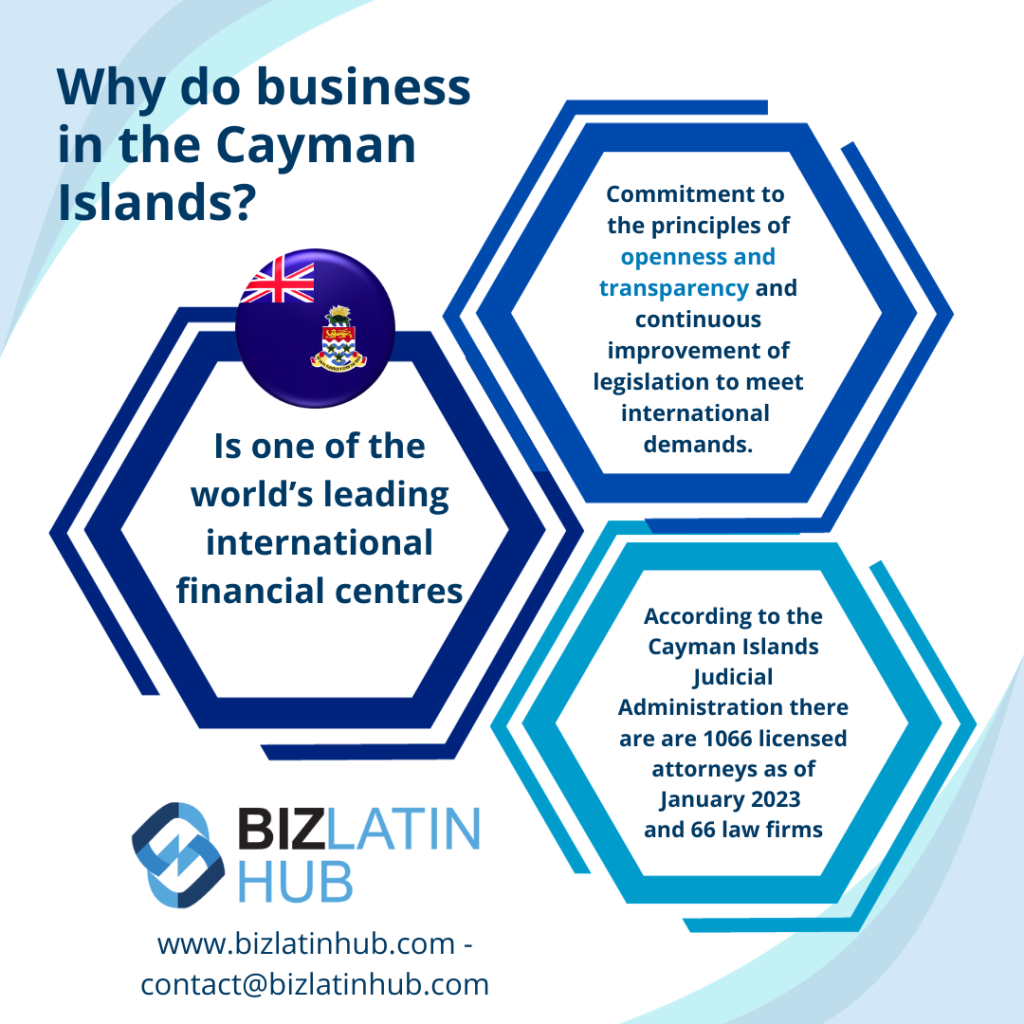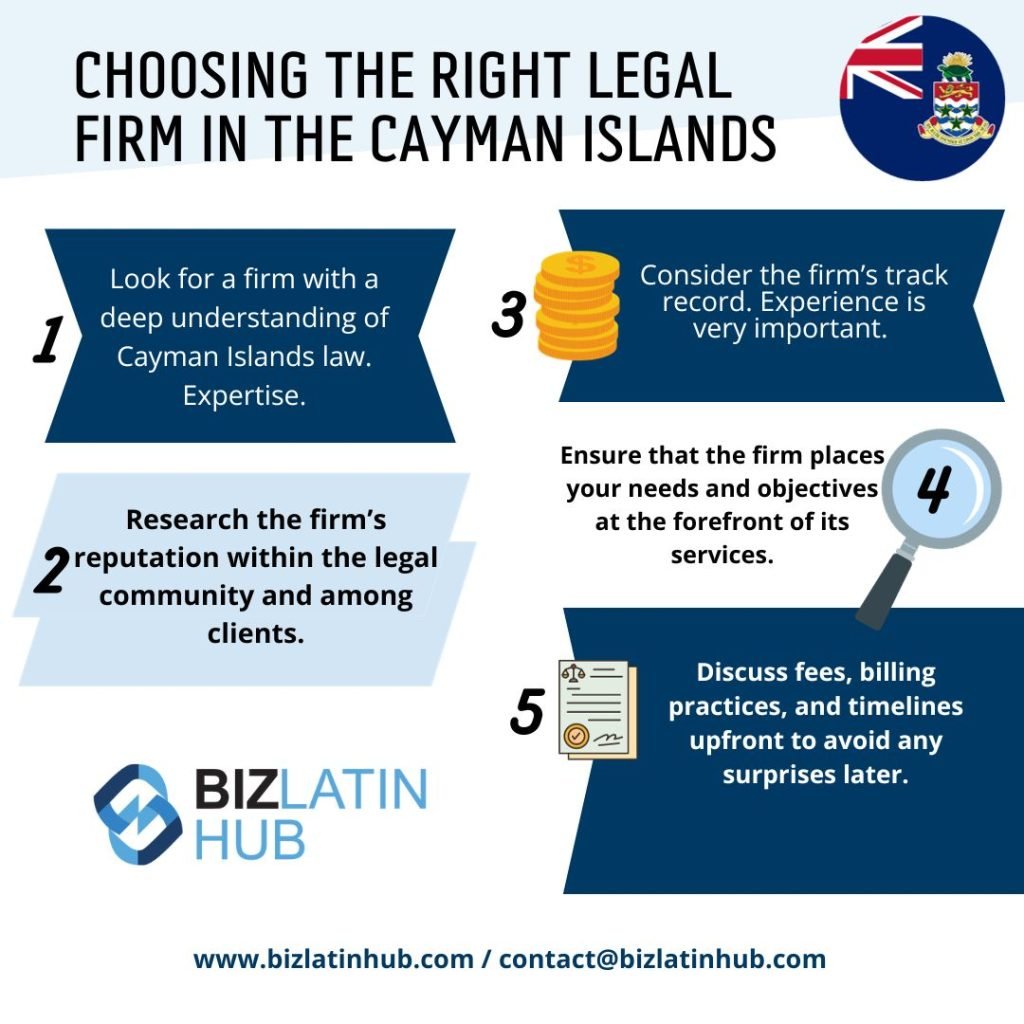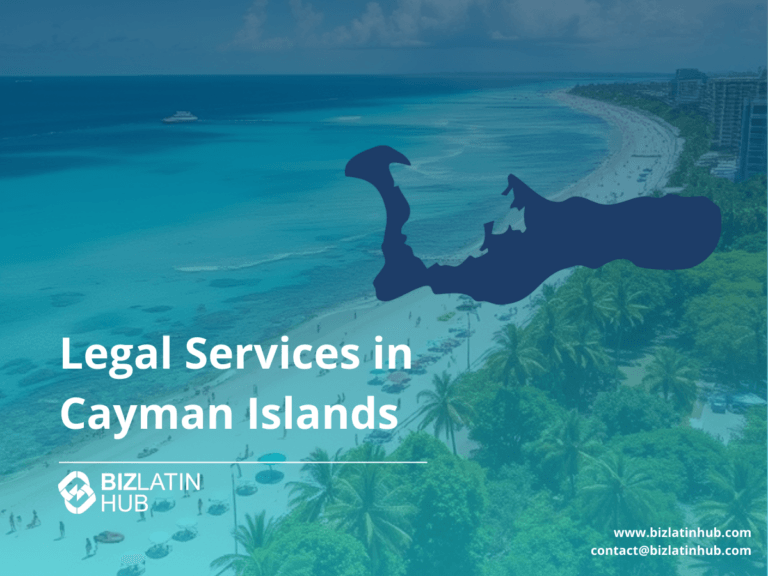In this article, we’ll look into the benefits of company formation in the Cayman Islands and which legal services in the Cayman Islands could be best for you. Making sure you stay on the right side of compliance is absolutely essential to operations in this jurisdiction. Corporate fiscal and legal compliance is taken ver seriously in order to uphold its reputation as a banking hub.
Key Takeaways On Corporate Legal Compliance in the Cayman Islands
| Is a physical address in the Cayman Islands necessary for doing business? | Yes, a registered local fiscal address is required for all entities in Cayman Islands for the receipt of legal correspondence and Governmental visits. |
| What are the annual entity fiscal compliance requirements? | Annual Financial Statements Auditing Tax Transparency Measures AML/CFT Compliance |
| What are the annual Entity Legal Compliance Requirements? | You have to provide a report with information on the key shareholders as well as activities undertaken by the company and board over the year. Connected to this is the new UBO reporting rules which came into effect at the start of 2025. |
| What common statutory appointments do companies make in the Cayman Islands? | An appointed local director who will be personally liable, both legally and financially for the good operation and standing of the company. This director can be the same as the shareholder and can be either a local national or a foreigner. |
| Why Choose to Invest in the Cayman Islands? | Some of the benefits are: Tax advantages Stability and infrastructure Global financial hub Ease of doing business |

The legal landscape for compliance in the Cayman Islands
Navigating the legal framework in the Cayman Islands is vital to operating successfully. Whether you’re handling corporate matters, financial regulations, or commercial litigation, having the right legal partner is essential. Here’s an overview of the legal services you may require:
- Corporate and commercial law: Companies in the Cayman Islands benefit from a flexible and modern corporate legal framework. Incorporating, structuring transactions, and corporate governance are essential services.
- Financial services regulation: Given the prominence of financial services, understanding and complying with financial regulations is crucial. Legal firms can assist with licensing, compliance, and regulatory matters.
- Trusts and estates: The Cayman Islands are renowned for their trust services. Legal experts can help you establish and manage trusts and navigate estate planning.
- Commercial litigation: When disputes occur, a commercial litigation team can be invaluable. Resolving conflicts efficiently and effectively is vital to protect your interests.
What to look for in legal services in the Cayman Islands
Selecting the right legal services provider is a decision that requires careful consideration. Here are some factors to keep in mind:
- Expertise: Look for a firm with a deep understanding of Cayman Islands law, particularly in your area of interest, whether it’s corporate law, financial regulation, or litigation.
- Reputation: Research the firm’s reputation within the legal community and among clients. Online reviews and referrals can provide valuable insights.
- Experience: Consider the firm’s track record. How long have they been operating in the Cayman Islands, and what notable cases or transactions have they handled?
- Client-centric approach: Ensure that the firm places your needs and objectives at the forefront of its services. Effective communication and personalized attention are essential.
- Global reach: If your business operates internationally, having a legal partner with a global network can be advantageous.
- Transparency: Discuss fees, billing practices, and timelines upfront to avoid any surprises later.

Fiscal Compliance in the Cayman Islands
The Cayman Islands, as an offshore financial center, has specific reporting requirements tailored to ensure transparency and compliance with international standards. Unlike the monthly tax reporting requirements in some jurisdictions, the Cayman Islands follows a different approach to reporting:
Annual Financial Statements: Companies registered in the Cayman Islands must prepare and submit annual financial statements in compliance with IFRS/IAS. These statements provide an accurate depiction of the company’s financial status, essential for transparency and accountability.
Auditing: Depending on the size and nature of their operations, companies in the Cayman Islands may be required to have their financial statements audited by an independent auditor. This step further ensures the accuracy and reliability of financial reporting.
Tax Transparency: The Cayman Islands has implemented measures to enhance tax transparency. This includes the automatic exchange of financial information with tax authorities in other jurisdictions as part of global efforts to combat tax evasion and promote financial transparency.
AML/CFT Compliance: Anti-Money Laundering (AML) and Counter Financing of Terrorism (CFT) regulations are crucial for the Cayman Islands’ reputation as a trustworthy financial center. Companies in the jurisdiction must adhere to these regulations, which help safeguard against financial crimes.
FAQs on legal compliance in the Cayman Islands
Based on our extensive experience these are the common questions and doubts of our clients when looking to operate within the country
The following are the most common statutory appointments for Caymanian legal entities:
An appointed local director who will be personally liable, both legally and financially for the good operation and standing of the company. This director can be the same as the shareholder and can be either a local national or a foreigner.
Yes, a registered local fiscal address is required for all entities in Cayman Islands for the receipt of legal correspondence and Governmental visits.
Some advantages of doing business in the Cayman Islands include the following:
Tax advantages: The Cayman Islands are well-known for their zero-tax regime. They do not impose any corporation, capital gains, income, payroll, property, withholding, or any other tax on money earned outside its territory. There are no direct taxes on corporations or individuals, no capital gains tax, and no estate taxes. This favorable tax climate is a magnet for businesses and investors alike, and it can help foreign investors optimize their tax efficiency and maximize their profits.
Stability and infrastructure: The Cayman Islands offer political and economic stability due to its advanced banking system. The legal system is based on English common law, and the financial infrastructure is robust, including a well-regulated financial services sector.
Global financial hub: With over 100,000 registered companies and a substantial presence of international banks, the Cayman Islands have earned their reputation as a global financial center. Furthermore, according to the Cayman Islands Judicial Administration, there are 1066 licensed attorneys and 66 law firms as of January 2023.
Ease of doing business: The Cayman Islands have a simple and fast incorporation process that can be completed within 1-4 working days, there is no minimum capital requirement, no need for a resident director, and no requirements for annual reporting, accounting, or auditing.
Legislation improvements: The Cayman Islands show commitment to the principles of openness and transparency and continuous improvement of legislation to meet international demands.
The key steps to choosing the right legal firm in the Cayman Islands are as follows:
Look for a firm with expertise and a deep understanding of Cayman Islands law.
Research the firm’s reputation within the legal community and among clients.
Consider the firm’s track record because experience is very important.
Ensure that the firm places your needs and objectives at the forefront of its services.
Discuss fees, billing practices, and timelines upfront to avoid any surprises later.
You may require the following legal services in the Cayman Islands:
Corporate and commercial law: Companies in the Cayman Islands benefit from a flexible and modern corporate legal framework. Incorporating, structuring transactions, and corporate governance are essential services.
Financial services regulation: Given the prominence of financial services, understanding and complying with financial regulations is crucial. Legal firms can assist with licensing, compliance, and regulatory matters.
Trusts and estates: The Cayman Islands are renowned for their trust services. Legal experts can help you establish and manage trusts and navigate estate planning.
Commercial litigation: When disputes occur, a commercial litigation team can be invaluable. Resolving conflicts efficiently and effectively is vital to protect your interests.
As you embark on your Cayman Islands business journey, remember that the legal services you choose can be the difference between success and obstacles. Make your choice wisely, and your business can flourish in this Caribbean paradise.
Why choose the Cayman Islands?
Let’s explore why businesses flock to the Cayman Islands. Investors need to find a proven legal firm in the Cayman Islands for several reasons.
Some of the benefits are:
- Tax advantages: The Cayman Islands are well-known for their zero-tax regime. They do not impose any corporation, capital gains, income, payroll, property, withholding, or any other tax on money earned outside its territory. There are no direct taxes on corporations or individuals, no capital gains tax, and no estate taxes. This favorable tax climate is a magnet for businesses and investors alike, and it can help foreign investors optimize their tax efficiency and maximize their profits.
- Stability and infrastructure: The Cayman Islands offer political and economic stability due to its advanced banking system. The legal system is based on English common law, and the financial infrastructure is robust, including a well-regulated financial services sector.
- Global financial hub: With over 100,000 registered companies and a substantial presence of international banks, the Cayman Islands have earned their reputation as a global financial center.
- Ease of doing business: The Cayman Islands have a simple and fast incorporation process that can be completed within 1-4 working days, there is no minimum capital requirement, no need for a resident director, and no requirements for annual reporting, accounting, or auditing.
Biz Latin Hub can help you with legal services in the Cayman Islands
At Biz Latin Hub, we provide integrated market entry and back-office services throughout Latin America and the Caribbean, with offices in Bogotá and Quito, as well as over a dozen other major cities in the region. We also have trusted partners in many other markets.
Our unrivaled reach means we are ideally placed to support multi-jurisdiction market entries and cross-border operations.
As well as knowledge about legal services in the Cayman Islands, our portfolio of services includes hiring & PEO, accounting & taxation, company formation, bank account opening, and corporate legal services.
Contact us today to find out more about how we can assist you in finding top talent or otherwise doing business in Latin America and the Caribbean.
If this article on legal services in the Cayman Islands was of interest to you, check out the rest of our coverage of the region. Or read about our team and expert authors.





